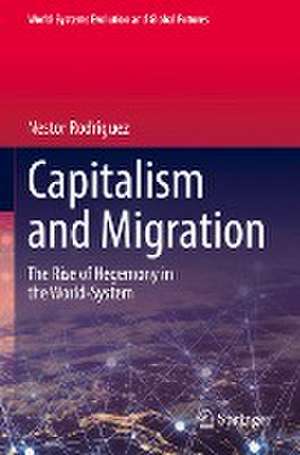Capitalism and Migration: The Rise of Hegemony in the World-System: World-Systems Evolution and Global Futures
Autor Nestor Rodriguezen Limba Engleză Paperback – 3 ian 2024
In turn, the book analyzes the migration patterns associated with the rise of hegemony from the perspectives of class relations between employers and workers, technological advances at the workplace, economic cycles, and state policies on labor migration. It concludes with a projection that heightened migration will continue to characterize the capitalist world system, especially as many poor and displaced populations in peripheral regions resort to migration for survival. Accordingly, it appeals to scholars in the fields of politics, sociology, history, anthropology, and economics who are interested in globalization and world-system analysis.
| Toate formatele și edițiile | Preț | Express |
|---|---|---|
| Paperback (1) | 636.80 lei 6-8 săpt. | |
| Springer International Publishing – 3 ian 2024 | 636.80 lei 6-8 săpt. | |
| Hardback (1) | 643.00 lei 6-8 săpt. | |
| Springer International Publishing – 2 ian 2023 | 643.00 lei 6-8 săpt. |
Din seria World-Systems Evolution and Global Futures
- 15%
 Preț: 636.45 lei
Preț: 636.45 lei - 18%
 Preț: 783.20 lei
Preț: 783.20 lei - 18%
 Preț: 783.20 lei
Preț: 783.20 lei - 15%
 Preț: 698.30 lei
Preț: 698.30 lei - 18%
 Preț: 733.15 lei
Preț: 733.15 lei -
 Preț: 452.62 lei
Preț: 452.62 lei - 15%
 Preț: 657.08 lei
Preț: 657.08 lei - 15%
 Preț: 643.16 lei
Preț: 643.16 lei - 18%
 Preț: 1125.86 lei
Preț: 1125.86 lei -
 Preț: 381.00 lei
Preț: 381.00 lei - 18%
 Preț: 1107.73 lei
Preț: 1107.73 lei - 18%
 Preț: 1104.43 lei
Preț: 1104.43 lei - 24%
 Preț: 676.84 lei
Preț: 676.84 lei - 18%
 Preț: 789.20 lei
Preț: 789.20 lei - 18%
 Preț: 1017.62 lei
Preț: 1017.62 lei - 9%
 Preț: 664.88 lei
Preț: 664.88 lei
Preț: 636.80 lei
Preț vechi: 749.19 lei
-15% Nou
Puncte Express: 955
Preț estimativ în valută:
121.85€ • 127.23$ • 100.62£
121.85€ • 127.23$ • 100.62£
Carte tipărită la comandă
Livrare economică 16-30 aprilie
Preluare comenzi: 021 569.72.76
Specificații
ISBN-13: 9783031220692
ISBN-10: 3031220692
Pagini: 209
Ilustrații: XIII, 209 p. 1 illus.
Dimensiuni: 155 x 235 mm
Greutate: 0.32 kg
Ediția:1st ed. 2023
Editura: Springer International Publishing
Colecția Springer
Seria World-Systems Evolution and Global Futures
Locul publicării:Cham, Switzerland
ISBN-10: 3031220692
Pagini: 209
Ilustrații: XIII, 209 p. 1 illus.
Dimensiuni: 155 x 235 mm
Greutate: 0.32 kg
Ediția:1st ed. 2023
Editura: Springer International Publishing
Colecția Springer
Seria World-Systems Evolution and Global Futures
Locul publicării:Cham, Switzerland
Cuprins
Notă biografică
Nestor Rodriguez is a professor of sociology at The University of Texas at Austin, USA. His research focuses on international migration of unauthorized migrants, Latin American migration to the USA, and state policies to control irregular immigration. He has also studied the deaths of unauthorized migrants at the US–Mexico border.
Textul de pe ultima copertă
This book explores the role of capital and labor migration in the expansion of the capitalist world-system. It presents comprehensive case studies on various historical periods of hegemony recognized by world-system theory: the Dutch hegemony (1625-1675), British hegemony (1815-1873), and US hegemony (1945-1970). Moreover, the book identifies an earlier period of economic dominance in Western Europe when merchant-bankers from Florence dominated the regional wool trade in the early thirteenth century. In these four intervals of dominance, i.e., from the medieval period to the late twentieth century, capital and labor migration formed the basis of capitalist development in the hegemonic core states as well as in peripheral regions under their economic and political influence.
In turn, the book analyzes the migration patterns associated with the rise of hegemony from the perspectives of class relations between employers and workers, technological advances at the workplace, economic cycles, and state policies on labor migration. It concludes with a projection that heightened migration will continue to characterize the capitalist world system, especially as many poor and displaced populations in peripheral regions resort to migration for survival. Accordingly, it appeals to scholars in the fields of politics, sociology, history, anthropology, and economics who are interested in globalization and world-system analysis.
In turn, the book analyzes the migration patterns associated with the rise of hegemony from the perspectives of class relations between employers and workers, technological advances at the workplace, economic cycles, and state policies on labor migration. It concludes with a projection that heightened migration will continue to characterize the capitalist world system, especially as many poor and displaced populations in peripheral regions resort to migration for survival. Accordingly, it appeals to scholars in the fields of politics, sociology, history, anthropology, and economics who are interested in globalization and world-system analysis.
Caracteristici
Explores the role of capital and labor migration in the expansion of the capitalist world-system Analyzes various historical periods of hegemony in the capitalist world-system Demonstrates how capital has been deeply implicated in the organization of labor migrations
